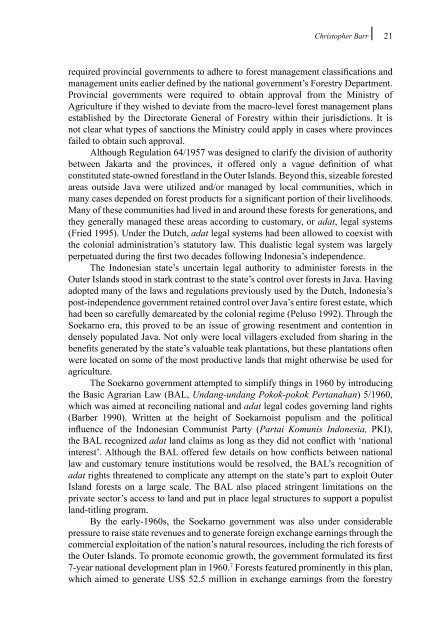Decentralization of Forest Administration in Indonesia, Implications ...
Decentralization of Forest Administration in Indonesia, Implications ...
Decentralization of Forest Administration in Indonesia, Implications ...
You also want an ePaper? Increase the reach of your titles
YUMPU automatically turns print PDFs into web optimized ePapers that Google loves.
Christopher Barr 21<br />
required prov<strong>in</strong>cial governments to adhere to forest management classifications and<br />
management units earlier def<strong>in</strong>ed by the national government’s <strong>Forest</strong>ry Department.<br />
Prov<strong>in</strong>cial governments were required to obta<strong>in</strong> approval from the M<strong>in</strong>istry <strong>of</strong><br />
Agriculture if they wished to deviate from the macro-level forest management plans<br />
established by the Directorate General <strong>of</strong> <strong>Forest</strong>ry with<strong>in</strong> their jurisdictions. It is<br />
not clear what types <strong>of</strong> sanctions the M<strong>in</strong>istry could apply <strong>in</strong> cases where prov<strong>in</strong>ces<br />
failed to obta<strong>in</strong> such approval.<br />
Although Regulation 64/1957 was designed to clarify the division <strong>of</strong> authority<br />
between Jakarta and the prov<strong>in</strong>ces, it <strong>of</strong>fered only a vague def<strong>in</strong>ition <strong>of</strong> what<br />
constituted state-owned forestland <strong>in</strong> the Outer Islands. Beyond this, sizeable forested<br />
areas outside Java were utilized and/or managed by local communities, which <strong>in</strong><br />
many cases depended on forest products for a significant portion <strong>of</strong> their livelihoods.<br />
Many <strong>of</strong> these communities had lived <strong>in</strong> and around these forests for generations, and<br />
they generally managed these areas accord<strong>in</strong>g to customary, or adat, legal systems<br />
(Fried 1995). Under the Dutch, adat legal systems had been allowed to coexist with<br />
the colonial adm<strong>in</strong>istration’s statutory law. This dualistic legal system was largely<br />
perpetuated dur<strong>in</strong>g the first two decades follow<strong>in</strong>g <strong>Indonesia</strong>’s <strong>in</strong>dependence.<br />
The <strong>Indonesia</strong>n state’s uncerta<strong>in</strong> legal authority to adm<strong>in</strong>ister forests <strong>in</strong> the<br />
Outer Islands stood <strong>in</strong> stark contrast to the state’s control over forests <strong>in</strong> Java. Hav<strong>in</strong>g<br />
adopted many <strong>of</strong> the laws and regulations previously used by the Dutch, <strong>Indonesia</strong>’s<br />
post-<strong>in</strong>dependence government reta<strong>in</strong>ed control over Java’s entire forest estate, which<br />
had been so carefully demarcated by the colonial regime (Peluso 1992). Through the<br />
Soekarno era, this proved to be an issue <strong>of</strong> grow<strong>in</strong>g resentment and contention <strong>in</strong><br />
densely populated Java. Not only were local villagers excluded from shar<strong>in</strong>g <strong>in</strong> the<br />
benefits generated by the state’s valuable teak plantations, but these plantations <strong>of</strong>ten<br />
were located on some <strong>of</strong> the most productive lands that might otherwise be used for<br />
agriculture.<br />
The Soekarno government attempted to simplify th<strong>in</strong>gs <strong>in</strong> 1960 by <strong>in</strong>troduc<strong>in</strong>g<br />
the Basic Agrarian Law (BAL, Undang-undang Pokok-pokok Pertanahan) 5/1960,<br />
which was aimed at reconcil<strong>in</strong>g national and adat legal codes govern<strong>in</strong>g land rights<br />
(Barber 1990). Written at the height <strong>of</strong> Soekarnoist populism and the political<br />
<strong>in</strong>fluence <strong>of</strong> the <strong>Indonesia</strong>n Communist Party (Partai Komunis <strong>Indonesia</strong>, PKI),<br />
the BAL recognized adat land claims as long as they did not conflict with ‘national<br />
<strong>in</strong>terest’. Although the BAL <strong>of</strong>fered few details on how conflicts between national<br />
law and customary tenure <strong>in</strong>stitutions would be resolved, the BAL’s recognition <strong>of</strong><br />
adat rights threatened to complicate any attempt on the state’s part to exploit Outer<br />
Island forests on a large scale. The BAL also placed str<strong>in</strong>gent limitations on the<br />
private sector’s access to land and put <strong>in</strong> place legal structures to support a populist<br />
land-titl<strong>in</strong>g program.<br />
By the early-1960s, the Soekarno government was also under considerable<br />
pressure to raise state revenues and to generate foreign exchange earn<strong>in</strong>gs through the<br />
commercial exploitation <strong>of</strong> the nation’s natural resources, <strong>in</strong>clud<strong>in</strong>g the rich forests <strong>of</strong><br />
the Outer Islands. To promote economic growth, the government formulated its first<br />
7-year national development plan <strong>in</strong> 1960. 7 <strong>Forest</strong>s featured prom<strong>in</strong>ently <strong>in</strong> this plan,<br />
which aimed to generate US$ 52.5 million <strong>in</strong> exchange earn<strong>in</strong>gs from the forestry

















